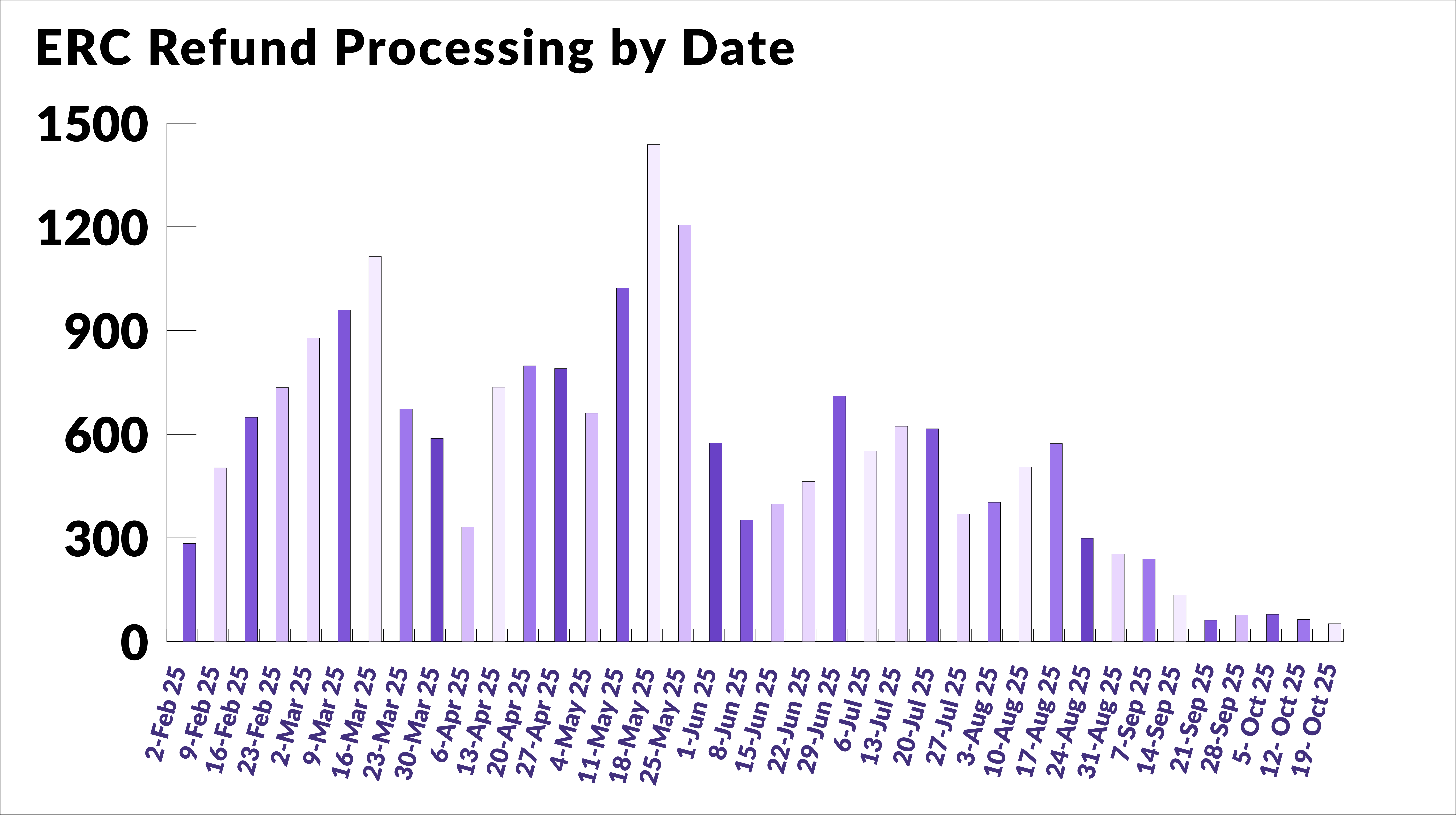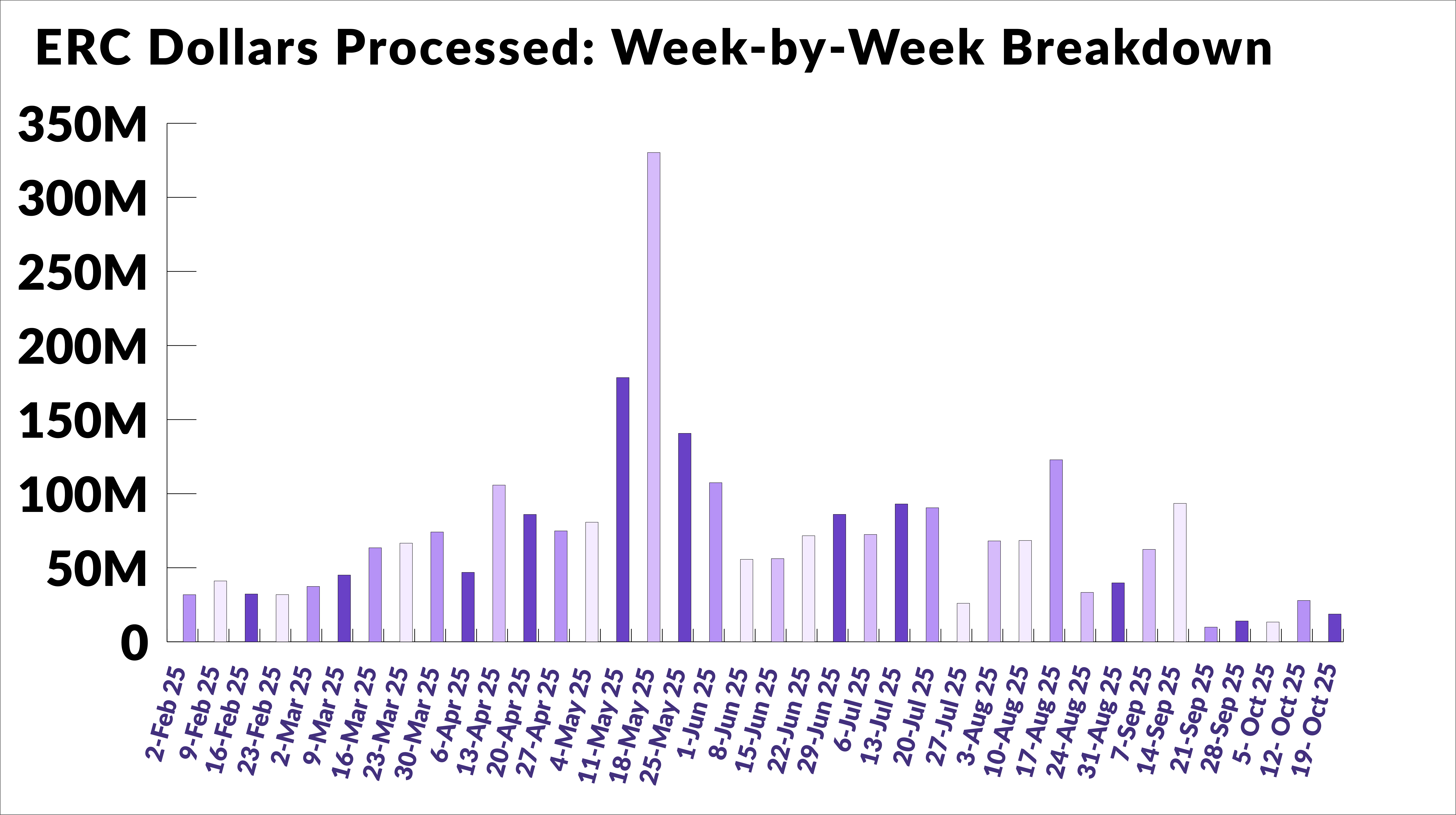
Amid a flood of new IRS headlines, the ERC pipeline has reached a breaking point. Refunds have sunk to new lows, while enforcement is surging to all-time highs. For small businesses that have already been waiting nearly a year and a half, the program is perhaps in its worst state yet, defined less by “relief” and more by audits, denials, and stagnation.
With no clear leadership at the IRS stepping forward to explain or correct the slowdown, it increasingly feels as though ERC claims are being suffocated and eradicated by design. With the Taxpayer Advocate Service’s offices currently shuttered, industry voices are urging businesses to contact their representatives in Congress to underscore the severity of the latest crisis and remind them of the promises they made when ERC legislation was passed.
📉 Total refunds processed: 52 refunds, down from 64 last week. That’s a new low for 2024 and the second-lowest weekly total since 2023.
📉 Total dollar volume: $18.7M, falling sharply from $27.9M the prior week.
📉 Average refund amount: $360,020, down from last week’s $435,644.
📉 Average days from filing to refund: 544 days, slightly shorter than last week’s 548 but still nearly 18 months of waiting.


1. IRS Furloughs Begin Amid Shutdown - With the government shutdown dragging on, the IRS has officially started furloughing employees. Roughly half of the Service’s workforce is now in non-pay, non-duty status, putting even more strain on already stalled processing operations. For ERC claimants, the furloughs further dim any hope of near-term progress.
2. IRS Hires First-Ever “CEO” - In a historic move, Treasury Secretary Bessent appointed Social Security chief Frank Bisignano as the first-ever CEO of the IRS. The role was created to oversee day-to-day IRS operations, signaling both urgency and institutional strain. Critics question whether splitting leadership across two agencies can stabilize the Service at a moment of unprecedented challenge.
3. Taxpayer Advocate Closed During Shutdown - The Taxpayer Advocate Service (TAS), one of the few outlets taxpayers had to push back against IRS dysfunction and ERC delays, has been closed in connection with the shutdown. For ERC filers, this removes a critical recourse point just as audits and denials are peaking, and two-year protest windows are shrinking.
4. Government Shutdown Enters Second Week - The federal shutdown, now in its second week, has furloughed nearly 900,000 federal workers while another 700,000 remain on the job without pay. Essential services like Medicare and Social Security continue, but many non-essential agencies have scaled back or halted operations. The White House estimates the shutdown could cost the economy up to $15 billion in GDP each week, while ripple effects are already being felt in areas like air travel, where staffing shortages are causing widespread delays. On the Hill, progress remains elusive. The Senate has failed multiple times to advance a funding bill, and while President Trump has signaled openness to a broader healthcare deal, he has insisted the government must reopen first before negotiations proceed. Meanwhile, new tensions have surfaced over whether furloughed workers will be guaranteed retroactive pay, and Democrats are floating relief bills to help workers cover child care and other expenses during the shutdown.
Kenny's Conclusions
The ERC program has now collided with the perfect storm: record-high audits, record-low refunds, and an IRS workforce hamstrung by mass furloughs and leadership turmoil. With the Taxpayer Advocate shuttered and Congress still deadlocked on funding, small businesses are left without answers, without relief, and without recourse. The longer this stalemate drags on, the clearer it becomes that ERC claimants aren’t just waiting, they’re being pushed to the margins. Unless lawmakers step in and force accountability, the promise of the ERC risks being erased not by law, but by neglect.
Signing off!
Kenny Dettman, CPA
Disclaimer: *𝘋𝘢𝘵𝘢 𝘴𝘦𝘵 𝘪𝘴 𝘧𝘳𝘰𝘮 𝘢𝘱𝘱𝘳𝘰𝘹𝘪𝘮𝘢𝘵𝘦𝘭𝘺 14,000 𝘣𝘶𝘴𝘪𝘯𝘦𝘴𝘴𝘦𝘴 𝘵𝘳𝘢𝘤𝘬𝘪𝘯𝘨 𝘌𝘙𝘊*